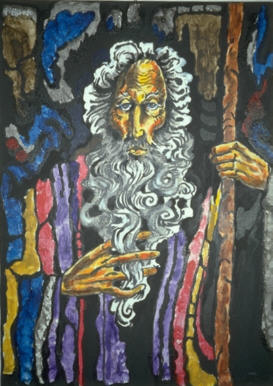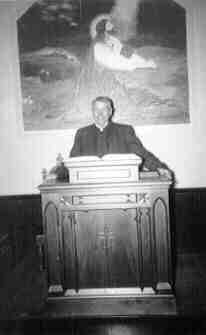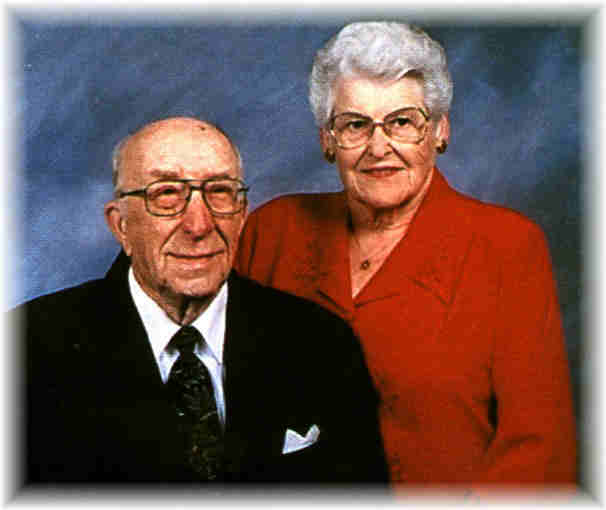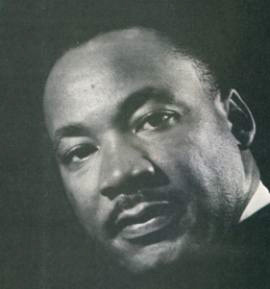
(Matthew 16:13-23)
May these words of this Peter be like a rock,
not a stumbling block!
|
|
"Who do you say
that I am?" Jesus asked. Simon Peter answered, "You
are the Messiah, the Son of the living God." And Jesus
answered, "Blessed are you, Simon son of Jonah! ... You are
Peter (petros), and on this rock (petra)
I will build my church..." Jesus then began to speak of
the rough road ahead. And Peter took him aside and rebuked him... "Get
behind me, Satan!" Jesus replied. "You are a stumbling
block..." (Matthew 16:13-23) May these words of this Peter be like a rock, |
"Remembering Moses"
Message preached
October 27, 2002
Long Green Valley Church of the Brethren
Glen Arm, Maryland USA
based upon Deuteronomy
34:1-12
Order
of Worship
(includes a lengthy dialog
"for all the saints")
 With those words, the Torah ends. The first five books of the Bible, which tell
the beginning of the earth and the people of God, and reveal the Divine Law to
the children of Israel, is now complete. As the page turns, so does a life. Upon
a mountain, Moses had earlier received his call from God before a burning bush.
Upon a mountain, he came face to face with the great "I am" and
received Godís commandments.
With those words, the Torah ends. The first five books of the Bible, which tell
the beginning of the earth and the people of God, and reveal the Divine Law to
the children of Israel, is now complete. As the page turns, so does a life. Upon
a mountain, Moses had earlier received his call from God before a burning bush.
Upon a mountain, he came face to face with the great "I am" and
received Godís commandments.
Here, at the end of his life, on the last page of the Torah, Moses is again upon a mountain. Before his eyes is spread the land first promised by God to Abraham and Sarah for their descendants. Between Moses and this promised land lies a river, which separates the past from the future. God says, "you shall not cross over there," and Moses did not. Upon the mountain, he breathed his last, and was buried. The text is sufficiently vague at this point and could be understood as "someone buried him," or even "God buried him." Or, as one Rabbi (Ibn Ezra) long ago wrote, "Moses buried himself," that is, he went away to die. (Plaut, p.1583) The scripture is clear about this: "no one knows his burial place to this day."
Last
weekend our family spent some time on another high place. Itís called "Montecello,"
which means "littl e
mountain." Restored on that hill is the mansion designed and built by a
remarkable man, Thomas Jefferson. Unlike Moses, we know exactly where this
founding father of our nation is buried. In a
e
mountain." Restored on that hill is the mansion designed and built by a
remarkable man, Thomas Jefferson. Unlike Moses, we know exactly where this
founding father of our nation is buried. In a  cemetery
on that "little mountain" is his grave. The monument above the spot
tells us that he wanted to be remembered as the writer of both the Declaration
of Independence and a state statute on religious liberty, as well as for
the
University of Virginia which he started.
cemetery
on that "little mountain" is his grave. The monument above the spot
tells us that he wanted to be remembered as the writer of both the Declaration
of Independence and a state statute on religious liberty, as well as for
the
University of Virginia which he started.
Walking through the gardens of Montecello, my son said something that at first really ticked me off. He complained about having to spend so much time at "the house of some old, dead guy." Eight dollars a ticket is a rather steep price just to be bored, I thought at the time. "Enjoy it," I wanted to say, "whether you like it or not." But later on, thinking back, I had to admit he was partially right. This house, as magnificent as it is, which bears tribute to an extraordinary mind, is really - when you get down to it - just "the house of some old, dead guy."
Itís important, though, that we remember those who have helped to pave the way for us. Where would we be as a nation had not Jefferson put his mind to work and penned those memorable words? "We hold these truths to be self-evident, that all men are created equal, that they are endowed by their Creator with certain unalienable Rights, that among these are Life, Liberty and the pursuit of Happiness."
Likewise,
where would we be as a people of God, had not Moses answered Godís burning
bush call, a nd
returned with the children of Israel to the mountain to receive the Torah and
lead them to the brink of the promised land? Do you think God would have tapped
someone else on the shoulder, had Moses said "no"?
nd
returned with the children of Israel to the mountain to receive the Torah and
lead them to the brink of the promised land? Do you think God would have tapped
someone else on the shoulder, had Moses said "no"?
Where would we be as a congregation, had not a certain John Matthias Prigel been set on fire by God at revival meeting and inspired to start a Brethren church here in the Long Green Valley? And what of all those folks who, walking with him, built not just a meetinghouse, but a living church - the one we now think of as ours? These were just ordinary people, you know - folks like you and me. Somehow, God touched this cast of characters in such a way that they became "saints."
No, saints arenít persons that we place up on some pedestal as more pious or worthy than anyone else. Saints are not a collection of individuals canonized by some earthly hierarchy. Granted, some Christians over time stand out, head and shoulders above the rest - but even they are no more "holy" than anyone else whom God calls and touches with his Spirit. The important point in the equation is not the one who has been touched, but the One who touches.
Iím thankful for this touch of God. As we remember our fore-bearers, the saints who have walked by faith before us, itís very important that we donít somehow end up worshiping them. Thatís one of the dangers Godís people consistently have faced over the years, and Brethren are no more immune from this temptation than anyone else. Paying attention to our genealogy is great, but we dare not slip over into ancestor worship. Itís very appropriate that we look and see and celebrate the holy touch of God upon those who have preceded us. Itís fitting that we pay attention to their example. But if our eyes are upon them instead of Jesus as we run the race of faith today, we will lose our way.
Iím
thankful for those saints here in the valley who helped move our fellowship from
a little, "holy huddle" in the valley and nudged us forward with a
mission. Last week, you heard a key person preach in my place, someone who - as
pastor -  helped
to expand the focus and size of this congregation. However, had it not been for
persons like Verlin Tombaugh, whom God had touched with a (if you will)
"holy" vision of this church being something more than it was at the
time, there would have been no Paul Groff here.
helped
to expand the focus and size of this congregation. However, had it not been for
persons like Verlin Tombaugh, whom God had touched with a (if you will)
"holy" vision of this church being something more than it was at the
time, there would have been no Paul Groff here.
Somewhere along the line God touched this people in such a way that the saints here became what many churches say they are, but arenít really - a warm fellowship. Every newcomer says the same thing about this church, that people here do love and care for one another. Itís not an act. As the song says, they "know we are Christians by our love," and that love did not originate in us. I believe some of that warmth was born out of struggle, in the crucible of trying to live together as brothers and sisters in Christ.
Of course, we havenít arrived at the end of the line of holiness. There is so much more that God is calling us to become. A "warm fellowship" is but a beginning step, in view of the path which lies ahead. The point, brothers and sisters, is that we are all saints in the true meaning of the word. God is touching us - you and me, as ordinary and ornery as we are - with a holy call. God is setting us apart for a divine purpose, shaping us into a people of faith today, that we might live leaning into the tomorrow that God is fashioning.
Thatís something we need to remember, even as we remember and celebrate those who have run with perseverance the race set before them. We donít worship, nor do we follow a bunch of "old, dead guys," to borrow from my son. We worship a living God, the One who led Moses to the edge of the promised land, but no further. I believe it was very wise that Moses did not enter. Yes, I know there were other reasons listed for it, but his absence meant that others stepped forward, touched by God, to lead the children of Israel on the next step of the journey. God continues to call forth the saints, even today. Thereís a new generation among us, and God continues to call these persons and touch them with holiness.
I also
believe it was wise that, as scripture says, no one knew where Moses was buried.
They couldnít go to his grave, then, and worship him instead of the One who
called him. They couldnít as easily avoid facing into Godís holy calling and
holy touch in their lives. They had to crossover the river and enter the
promised land. That was the next page that needed to be turned. The rest is
history. And we are no different in that regard. The only difference is that the
grave we wonít find anywhere in Israel today is the one in which Jesus was
laid - you know, the "empty" one. But thatís a whole Ďnother
story. Our story!
I canít leave this scripture about Moses, without remembering the words of another preacher whom God touched with a holy calling. On the night before he was assassinated by a another sniperís bullet, Martin Luther King jr. finished off his last sermon with these words, which transcend his own calling to non-violently push for the civil rights of his people. They are words which, I pray, could be uttered by all the saints, as we "run with perseverance the race that is set before us, looking to Jesus the pioneer and perfecter of our faith, who for the sake of the joy that was set before him endured the cross, disregarding its shame, and has taken his seat at the right hand of the throne of God." (Hebrews 12:1b-2) Listen.
"Well, I don't know what will happen now. We've got some difficult days ahead. But it doesn't matter with me now. Because I've been to the mountaintop. And I don't mind. Like anybody, I would like to live a long life. Longevity has its place. But I'm not concerned about that now. I just want to do God's will. And He's allowed me to go up to the mountain. And I've looked over. And I've seen the promised land. I may not get there with you. But I want you to know tonight, that we, as a people, will get to the promised land. And I'm happy, tonight. I'm not worried about anything. I'm not fearing any man. Mine eyes have seen the glory of the coming of the Lord."
Martin Luther King jr. - "I See
The Promised Land"
(delivered April 3, 1968, Memphis, Tennessee)
online text
of message, or listen to realmedia
audioclip of final paragraph.
Here taken from A Testament of Hope:
The Essential Writings and Speeches of Martin Luther King, jr.,
ed. James M. Washington, Harper, ©1986, p. 286.
| online resources for this scripture text |
For commentaries consulted, see Deuteronomy. |
©2002 Peter L. Haynes